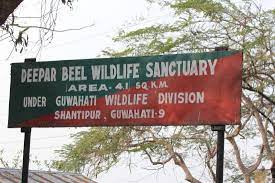Eco-Sensitive Zone Of The Deepar Beel Wildlife Sanctuary:

Ministry of Environment, Forest and Climate Change has notified the eco-sensitive zone of the Deepar Beel Wildlife Sanctuary on the south-western edge of Guwahati.
- The notification specified an area “to an extent varying from 294 metres to 16.32 km” as the eco-sensitive zone, with the total area being 148.9767 sq. km.
- The wetland has for decades been threatened by a railway track — set to be doubled and electrified — on its southern rim, a garbage dump, and encroachment from human habitation and commercial units.
- No new commercial hotels and resorts shall be permitted within 1 km of the boundary of the protected area or up to the extent of the eco-sensitive zone, whichever is nearer, except for small temporary structures for eco-tourism activities.
- Among activities prohibited in the eco-sensitive zone are hydroelectric projects, brick kilns, commercial use of firewood and discharge of untreated effluents in natural water bodies or land areas.
- Deepar Beel is one of the largest freshwater lakes in Assam and the State’s only Ramsar site besides being an Important Bird Area.
- It is a permanent freshwater lake, in a former channel of the Brahmaputra River, to the south of the main river.
- The wetland of Deepar Beel constitutes a unique habitat for aquatic flora and avian fauna.
- About 150 species of birds have been recorded in the sanctuary, out of which two are critically endangered, one endangered, five vulnerable and four near-threatened.
- Elephants regularly visit the wetland from adjoining Rani and Garhbhanda Reserve Forest and the wetland is an integral part of the elephant habitat.
- Besides these, 12 species of reptiles, 50 species of fish, six species of amphibians along with 155 species of aquatic macro-biota have been recorded in the sanctuary.
Eco-sensitive Zones (ESZs):
- Eco-Sensitive Zones (ESZs) or Ecologically Fragile Areas (EFAs) are areas notified by the MoEFCC around Protected Areas, National Parks and Wildlife Sanctuaries.




